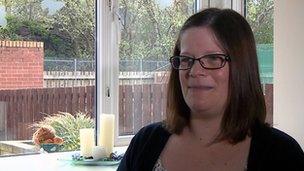Unit in Glasgow to test new drugs for MS
- Published
New treatments for MS will be clinically tested at the new unit in Glasgow
Scotland is to benefit from a dedicated centre to test potential new treatments for multiple sclerosis.
The MS trials unit at the Southern General in Glasgow will conduct clinical trials of drugs which could delay the progression of the condition.
Scotland has the highest incidence of MS in the world, which makes it a top destination for drugs companies who want to test new treatments.
Experts say the unit will help bring more lab-based research to the market.
Consultant neurologist, Dr James Overell, who will work in the new unit, said: "This is a very exciting time in MS research.
"I can diagnose up to five people a week with the condition.
"Their main concern often is not always for the here and now, but what will happen to them later in life. Will they be in a wheelchair by the time they are 50? The unit will be able to give patients access to experimental treatments first and faster."
Susanne McLean was diagnosed with MS shortly after she turned 30.
"I finally got my diagnosis after about four years of different little symptoms cropping every now and again, " she said.
"To be honest it was actually a relief to hear that that's what I had, not a brain tumour or anything like that. I was quite pleased.
"Within about 24 hours I was over the upset part and just wanted to get going and find out as much as a I could about it."
Susanne is now pregnant with her first child and like many women with MS has seen her symptoms ease during pregnancy.
"Once the second trimester kicked in I had a lot of my feelings back and my fatigue disappeared, it is great," she said.
She is now hopeful a treatment will eventually be developed which will slow down progression of the disease.
"When it is bad, sometimes I can be bed-bound, other times it's just house-bound. It mostly affects my walking, my cognitive thinking, trying to find words can be quite hard and the fatigue will floor me as well.

Susanne McLean hopes the unit will help with the development of drugs to slow the progression of MS
"I don't think too far into the future but I do believe I will eventually be able to get on to a treatment that will slow it right down and I'll have very, very few relapses hopefully."
Scotland already has a research centre in Edinburgh for multiple sclerosis funded by the Harry Potter author JK Rowling.
The Anne Rowling Regenerative Neurology Clinic concentrates on research at an earlier pre-clinical stage.
Dr Overell said the two centres should complement each other in helping to bring exciting new research developments to trial and on to the market.
He added: "Unlike a lot of other illnesses for which there are no new drug options available, MS is a growth area."
"We have time to build something which could make real headway into helping people with MS live the lives they want, and deserve, for longer."
The funding is from the Chief Scientist Office (CSO) of the Scottish government health and social care directorates as part of a national initiative called NHS Research Scotland (NRS).
- Published29 April 2013
- Published25 December 2012
- Published11 December 2012
- Published1 November 2012